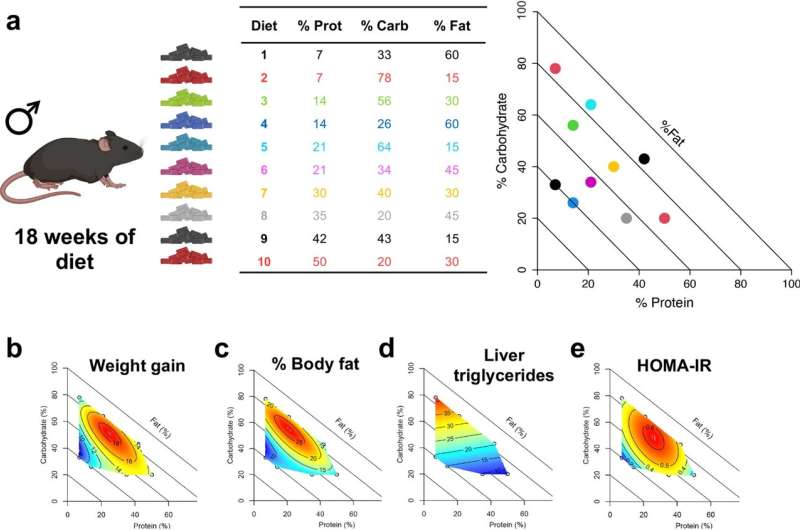This article has been reviewed according to Science X's editorial process and policies. Editors have highlighted the following attributes while ensuring the content's credibility:
fact-checked
peer-reviewed publication
trusted source
proofread
Mouse study shows how a father's diet can shape the health of his offspring

A study of mice suggests a father's diet may shape the anxiety of his sons and the metabolic health of his daughters before they are even conceived.
New research published in Nature Communications finds that the macronutrient balance in the diet of male mice affects the level of anxiety-like behavior of sons and the metabolic health of daughters.
The research provides a step towards understanding how the effect of diet can transmit from one generation to the next via a father's sperm. It could ultimately inform dietary guidelines for fathers-to-be, with the goal of lowering the risk of metabolic disease and mood disorders in the next generation.
Parents like to believe they can shape the interests and behavior of their children, with mixed success. But a new study from an international team of researchers confirms this is the case for mice, with father's shaping their children's health through their own diet.
Scientists have already discovered that a mouse father's diet can have an impact not only on his own reproductive health but on that of his offspring. Over- or under-feeding male mice can affect their offspring's metabolism and behavior, as well as their risk of cancer).
What is less understood is whether there are diverse types of health impacts on the health of offspring, depending on the type and composition of the diet of male mice before conception.
This was the starting point for the research by scientists in the international GECKO consortium, with lead investigators in Copenhagen, Sydney, and Chicago.
At the University of Sydney's Charles Perkins Center in Australia researchers fed male mice one of ten diets differing in the proportions of protein, fats, and carbohydrates, then allowed them to mate with females reared on standard diet. The behavior and physiology of the resulting pups were then studied.
Dietary composition as important as number of calories
The scientists discovered that male mice fed low protein and high carbohydrate diets were more likely to have male offspring with higher levels of anxiety, as measured by time spent in the safety zones of their maze. They also found that male mice that were fed high fat diets were more likely to have daughters with higher levels of body fat and markers of metabolic disease.
"Our study shows that the type of diet eaten before conception can program specific characteristics of the next generation," says co-senior author and leader of the GECKO consortium Professor Romain Barrès, from the University of Copenhagen and Université Côte d'Azur, Nice.
"It is extraordinary that by titrating mixtures of protein, fat and carbs in the father's diet we could influence specific features of his sons and daughters health and behavior. There is some important biology at play here," said Professor Stephen Simpson, co-senior author and Academic Director of the Charles Perkins Center at the University of Sydney.
The team also observed that males on a low protein diet also ate more food overall. However, thanks to the study design, they could determine that both the amount of calories, and the macronutrient composition of the males' diets, influenced the health of their offspring.
"Our study shows that it's not just eating too much or too little, but the composition of the diet that can have an impact on future children," says Professor Romain Barrès.
The work was conducted in mice and has opened the way for the team to study the molecular mechanisms involved. The mouse work is part of a broader series of studies within the GECKO consortium, involving humans and other mammals at partner institutions.
"We think our study is a step towards establishing dietary guidelines for fathers to be, with the ultimate goal of lowering the risk of metabolic disease and mood disorders in the next generation," says Professor Romain Barrès.
More information: Angela Jane Crean et al, Paternal dietary macronutrient balance and energy intake drive metabolic and behavioral differences among offspring, Nature Communications (2024). DOI: 10.1038/s41467-024-46782-y




















